
Michelle Henry, founder and managing director of HNS Signs demonstrating the wall art skills that the company is known for, along with the team’s capabilities for quirky design
In an industry that has traditionally been very much a ‘man’s world’, we are increasingly seeing the rise of highly successful women in management or business owner roles. Having a natural sense of curiosity (some would call it ‘nosiness’), I was intrigued to find out more about these exceptional ladies and what makes them ‘tick’. In my quest to gain some insight I spoke to five of our industry’s leading lights.
It is interesting to note that, with one exception, all of them had begun work at 16 or 17 and none of them started their careers in the world of sign-making.
Sam Armstrong, sales director at Applelec, began her career in customer service on leaving school at 16, when her very first role was on the reception of Champneys Spa. Her next step was a position as events manager for a hotel, which included managing the hotel’s wedding bookings.
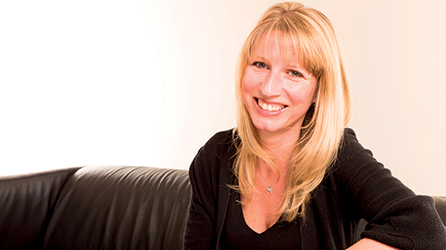
Applelec sales director, Sam Armstrong, enjoys the processes involved in taking someone’s idea for a sign, often a rough sketch, and coming up with a plan to make their idea a reality
“So I guess you could say I was a wedding planner,” Armstrong laughs, before adding: “However, one thing I took from this role, which initially sounds strange and completely unconnected to signage manufacturing, is an understanding of what makes exceptional customer service. Helping to plan people’s weddings meant I was involved in one of the most personal and important days of their lives, so if any role can teach you about great customer service, it’s that.”
After these positions, she worked in sales roles in the sign industry for several years before joining Applelec in 2006 as southern sales manager.
She was appointed sales director in 2009. Armstrong continues: “I really enjoy the processes involved in taking somebody’s idea for a sign, often a rough sketch, and coming up with a plan to make their idea a reality.
“I love being able to come up with different ideas and options and find ways to make a sign that’s more cost effective, more energy efficient or simply a more successful construction. When we achieve this for our customers I feel an enormous sense of pride.”
Applelec has a number of women in senior roles, including their accounts manager, marketing manager, lighting and signage sales managers, along with one of their four business development managers.
“The split in management isn’t quite 50/50 but it’s very close; although I should point out there is no overall design to this,” comments Armstrong. “We just employ the best people we can find in any role and I don’t think that gender has ever been part of the decision making process.”
Innova Solutions’ operations director Linda Barrowclough also started work at 16, at Natwest Bank. “I’d always wanted to work in a bank; I loved numbers, maths and accountancy were my favourite subjects at school,” says Barrowclough, adding: “I worked my way up from office junior to senior manager’s assistant in eight years achieving my ACIB (associate of Chartered Institute of Bankers) qualification just before I left the bank to have my first child (now age 24).”
After a career break of around ten years, she started some casual work for the bank, but when Glenn Dunleavy (owner and managing director of Innova Solutions, and a personal friend) asked if she would consider working for him, she decided to take a change of direction.
“I started at Innova in 2005, working just ten hours a week in what was effectively a ‘junior’ role, answering phones and dealing with accounts/sales enquiries, until the office manager left and I took over her full time role,” explains Barrowclough.
Her banking background subsequently led to her taking on a financial role, as well as responsibility for HR and training. She continues: “Fast forward almost ten years and I am operations director (appointed in February 2014). It was a massive highlight to be recognised in this way—I hadn’t known it was going to happen.”
Barrowclough explains further that she fell into the industry rather than choosing it. “I knew nothing and have learned everything from the ground up; my background has always been financial,” continues Barrowclough, adding: “When I first joined, Innova was still a very young business and there was very little technology to help me at the time. It was quite daunting and I had a big learning curve to acquire knowledge of the industry and products, although it would have been the same for a man starting from scratch.”
Self-starters
As with the above, Fairfield Displays’ marketing director Janice Fairfield also entered the industry from a completely different background. She says: “My background was very unusual for someone entering the sign business, but my skill set proved incredibly useful. I trained in public relations and also completed the first stage of a course to become a printer.
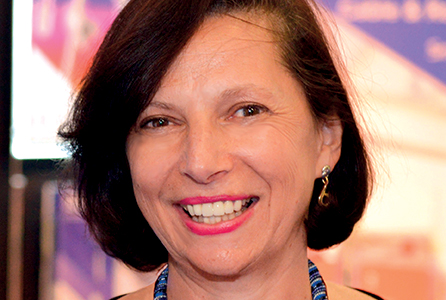
Janice Fairfield, marketing director of Fairfield Displays says that it is an advantage to be a woman, as clients tend to remember you
“I started working at 17 and we started the business when I was 22. I was very young and learnt a lot by trying out different ideas and it was determination that made the business successful. I had always planned to have my own business, but was not sure exactly what I wanted to do.
“My husband and I lived in France for 18 months and we met up with a company that was looking for a distributor for display equipment. As we both spoke French we said we would be delighted to have the opportunity to start selling their product. Our first office was in a back bedroom and I got a part time job just to pay for the start-up business costs. It was nearly a year later that my husband gave up his job as an accountant and the business was set up on the back of an exhibition, which gave us sales leads to follow up.”
The main opportunity was spotted when they realised that the suspended cable system was only available in France and nothing like it was available in the UK. “We found the name of the company, contacted them and told them that they now had a distributor in the UK and this was the start of us selling into the sign industry. Fairfield created the market for suspended cable/rod supports and sign supports in the UK and now we export across the world,” concludes Fairfield.
Debra Jamieson, sales and marketing director of UK Point of Sale, is another example of a successful woman who started young and in a different industry. “It was a very different landscape when I left school in comparison to the experience my daughters have recently both had,” observes Jamieson.
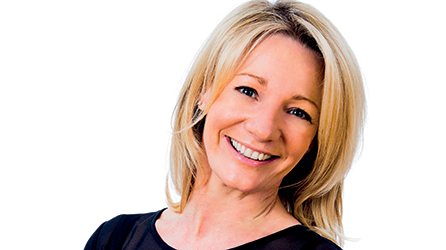
Debra Jamieson, sales and marketing director of UK Point of Sale, who is a pivotal part of her 20-year-old family business
She continues: “University wasn’t accessible for the majority of people, so at 16 I went out into the world of work. Having quickly realised that customer service was my forte, I found myself in a management role at only 19 years old.”
It was then that her desire to travel motivated her to look for an opportunity that would allow her to combine this with a new career. So she joined a luxury holiday company where she had full responsibility for all holiday makers including itineraries, border crossings, and general logistics for each trip.
“This provided a platform to work for the best tour operator at the time, Thompson, and really honed my interpersonal skills and problem solving abilities,” says Jamieson.
On returning to the UK, she remained in the travel industry and had a customer service role at Manchester Airport. However, starting a family meant she needed a role that would fit in around family life and she also wanted to a new challenge.
Jamieson takes up the story: “I started working for the AA in its telemarketing department, working evenings and this was a huge learning curve for me in terms of my professional development. Working for a big corporate organisation really taught me about business process, professional procedures, HR, and provided me with solid basis, which I was able to take with me to UK Point of Sale.
“I’ve worked in most departments in this business, which has been critical to developing a genuine technical knowledge regarding materials and products. I started as a sales advisor, then moved into product manufacturing, then back into sales and marketing when it became apparent that the business was missing a voice—someone who could provide credible and knowledgeable advice and information to clients in a service and experience-centric manner.”
UK Point of Sale was set up nearly 20 years ago by Jamieson’s father and brother, but Jamieson had been cautious about joining the company full time: “I consciously held off being fully involved, as I knew how consuming it would be, particularly when I was juggling a young family. However, on my days off I would help out at exhibitions and be the face of the business with prospective clients. Then, when my youngest daughter was three I finally joined them in a part time capacity, which very quickly became full time.”

I was absorbing the industry without knowing it, so it was inevitable that I would end up where I am today”
Looking back, Jamieson notes that childhood experience had its influences: “From a very young age Jason and I would often spend our Saturdays at screen printers or on store audits,” she says, adding: “I was absorbing the industry without knowing it, so it was inevitable that I would end up where I am today.”
Died in the wool
If Michelle Henry, founder and director of HNS Signs, was a stick of rock, she would probably have ‘sign-making’ written right through her centre. With the aforementioned ladies all working on the supply end of the industry, it was interesting to hear a story from the manufacturing sector.
Henry recalls: “My great grandfather and my grandfather were sign writers, so I have grown up around the sign trade. When I was four I used to make signs for my friends’ bedroom doors and when I visited my grandparents most weekends, I used to enjoy making pictures on the window of their kitchen door, using self-adhesive vinyl. It was always something that I did for fun, but as I got older I was encouraged to help out over holidays doing engraving, weeding, screen-print and vehicle graphics.”
When she left school, Henry went on to study law and was determined to do the Bar. She says: “It wasn’t until I went travelling around Australia and got a job in a sign shop that I fell back in love with signwriting. I knew then that law wasn’t for me.”
When she returned to the UK she started working for a sign company in Redditch, which sadly went into administration after she had been there around six months. However, opportunity comes in many guises, as Henry discovered: “I looked after the contract for The Birmingham Children’s Hospital, so paid them a courtesy visit to explain the situation and apologise. I had even made a list of recommended sign companies to pass onto them, but they were not interested in any other sign-maker.
“They encouraged me to go it alone; and that is what I did. They filled me with such confidence and excitement that I went home, looked at my savings and, liaising with the company’s accountants, worked out what assets I could afford to purchase and set up on my own. I got a start-up loan from the Princes Trust and two months later HNS was born.”
Being resourceful by nature, Henry did her first couple of jobs from a friend’s garage until she managed to find a more permanent home, moving in with a screen-print business which was struggling with costs due to the recession. “Three years later I moved into a 5,000 square foot unit of my own in the city centre,” Henry says with pride.
Highs and lows
Running or managing a business, or a significant element of it, is never easy so I was interested to know what highs and lows these successful women had faced along the way, and how these might have influenced the direction of the business.
Top of the list of ‘highs’ for Innova’s Barrowclough was being appreciated for her contribution to the business by being appointed a director. Also on her list is obtaining around £75,000 grant funding for a new warehouse for increased storage capacity to enable expansion business into Europe. Barrowclough undertook the whole process herself, from grant application, with the company being awarded the full 50 percent funding available, through to project managing the building of the warehouse.
A New Apprentice Employer award for Innova from Nelson and Colne College, with which Barrowclough has forged a good relationship, is another accolade of which she is proud.
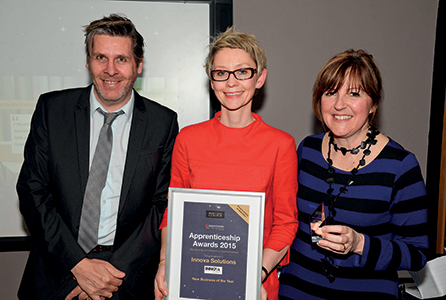
One of the ‘highs’ for Innova’s Linda Barrowclough was a New Apprentice Employer award from Nelson and Colne College. Pictured (L to R): Tony Livesey, Linda Barrowclough, and Amanda Melton
“We have two apprentices and I feel privileged to be in an industry where we can employ young people and give them an opportunity. I enjoy mentoring young people and watching them grow and develop,” Barrowclough says enthusiastically.

I feel privileged to be in an industry where we can employ young people and give them an opportunity”
On the other side of the scales is the recession of 2008/2009 where the business was scaled back and expenditure reined in to ensure that staff did not suffer. “But it made Innova stronger as a business and as soon as the upturn came we acquired another business,” explains Barrowclough.
She adds: “Our managing director, Glenn Dunleavy, has great forward vision for the company and my role will to be to steer it and ensure that it happens.
Awards and client wins are highs on the list for Jamieson: “We won the Manchester Evening News Business Awards a few years back having never entered an award before, it made us realise we had a great success story to tell and be proud of.
“Two particular account wins are also up there as career highlights. Morrisons because it was initially a small opportunity that we really grew through bespoke new product development and understanding their business and its challenges. Pets at Home was also similar in that our research and development enhanced their product offering and customer engagement. This has driven our enthusiasm and appetite to fully understand our clients and underpins our business today.”
Jamieson says there have been a couple of low points that ultimately led to a positive outcome. She explains: “A ceiling fell in on us at an exhibition in Manchester, ruining our stand; but I didn’t let it stop us and we ended up picking up a great contract. And in more recent years, we had to pull out of a deal for new premises in Stockport; it was a pretty difficult and stressful time but turned out to be the best decision for the business. I always believe things happen for a reason.”
Fairfield outlines the ups and downs of growing a new business: “At the beginning it was really tough. I used to go out selling the displays and then go back and install the equipment which was often very heavy, not to mention running the home at the same time. Owning your own business seems that you are working around the clock and when you have young children this can be tough. It is often a very fine line in getting the balance right. There is nothing better than closing a large order that you have managed from start to finish.”
She continues: “As the company has grown I have taken on the role as marketing director being responsible for creating all the marketing material, planning exhibitions and ensuring that we have the latest easy to use websites. It has been a challenge to keep up with the latest technology, when you think we did not even have a fax machine or computer when I first started. I have now designed and exhibited at over 100 exhibitions in my career and this can be absolutely exhausting. You can spend hours designing and launching a new product and just once in a while you get a true winner. And along the way I have made friendships with many customers that have lasted over many years.”
From the viewpoint of a much younger business that also offers traditional sign-making disciplines, HNS Signs’ Henry says her first highlight was being able to hire staff: “My first employee, Macauley Jenkinson, is still with me now. I am so proud of being able to offer employment to others and to be able to train future sign-writers in all of the traditional methods of gilding and traditional sign-writing.”
2014 was a big year on the awards front, with HNS Signs winning the Craftsman Award at the BSGA British Sign Awards. “This was a huge achievement for us and it was great to be recognised for our ability to make things by hand,” acknowledges Henry, adding: “We also picked up a few business awards and earlier this year we were shortlisted for an international award in Germany.”
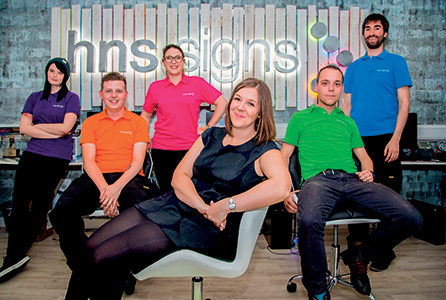
HNS Signs’ Michelle Henry with her team. Pictured (L to R): Mary Hughes (sign writer and apprentice graphic designer), Macauley Jenkinson (sign writer and installer), Severine Painteaux (French marketing intern), Tom Chandler (sign writer), and Raphael Gand (graphic designer)
In addition, the company achieved Highly Commended for the Craftsman Award and Small Signmaker of the Year Award at the British Sign Awards 2015. Henry says that probably the biggest achievement is the recognition that HNS Signs is getting for being unique.
“As a team, we are known for our quirky design capabilities and our wall art skills. We are getting people referred to us from marketing agencies all over the UK. It’s amazing! We have also branched out now to being brand partners and are now offering branding for corporates. We have invested in a second company called Lumina Studios that offer video and photography, enabling us to offer everything in-house. There is no stopping us,” exclaims Henry.
The lows she has faced have been mostly personal, one of the most significant being the loss of her nan three years ago. She adds: “To all intents and purposes she was my role model. Having run her sign company so successfully for years, I would often go to her for advice. However, my team are fantastic and will always do whatever they can to help reduce stress. I am very lucky with that. I couldn’t ask for a better team.
A man’s world?
Although there has been an increase in women in senior roles over the past few years, the sign industry is undoubtedly still a male dominated industry, so what are the pros and cons for women who hold leading roles?
Armstrong is philosophical about this: “I’ve never really felt like it’s made much of a difference to my job that I’m a woman. I’ve always felt as though my customers respect my knowledge and that we have a good laugh along the way. I’m still getting texts from customers taking the mickey out of me for our ‘Top Tip’ advert series—but this would be happening whether I was male or female. Saying all that though, I have been sent flowers by customers on five occasions to thank me for jobs that have gone well, and that wouldn’t have happened to a bloke.”
For Barrowclough it has been the opportunity to have a good work and life balance: “Work/life balance is very important—it makes you a better person. Women are very adaptable, whatever industry they’re in. Having children young gave me the best of both worlds. Now I feel it’s ‘my time’ and I’m having the time of my life.”

Women are very adaptable, whatever industry they’re in”
She comments that working in a male dominated industry can work to advantage: “I know a lot about our products and how they perform, so when I speak to people on the phone they are often surprised and refreshed to find that (as a woman) I have so much knowledge. However, I’m not saying that this is stereotypical.”
Fairfield continues this train of thought: “I think it is an advantage to be a woman in a man’s business as clients tend to remember you. However, as a woman you can get through the door, but then you have to prove that you have good product knowledge and can understand their requirements. As an owner of a business I have not had to fight my way up a ladder of men, which I think has been a huge advantage, but I have had to gain the respect of my fellow workers.”
O Factoid: Gallup's 2015 report State of the American Manager discovered that employees who work for a female boss are, on average, 6 percent more engaged than those who work for a male manager. O
Jamieson remarks: “The sign industry has always been a fairly traditional one, however I have never had a limit placed on my success and what I can achieve. It’s a really creative industry, where no day is the same and that’s what I especially love. I am very proud to be a UK-based manufacturer. However it’s our people that make a difference to our business. I find being a key influencer in helping people flourish in their careers is a huge positive factor in the role I am in.”
Like Barrowclough, Jamieson notes the importance of a work and life balance: “Family pressures are always hard to juggle, and being a working mum in an intensive environment has constantly been a challenge, especially when it comes to being away for periods of time for exhibitions. Being part of a family business also brings with it the added weight of not only never letting yourself down, but even more so, your family.”
Henry has found that the only con has been preconceived stereotypes: “In the past I have had customers thinking that I couldn’t possibly fix a sign myself as I am female, but I soon proved them wrong and enjoyed doing so.”
On the pro side, Henry has an interesting take on making sure she gets the best from her team: “Apparently women make better employers because we are more caring towards our staff and considerate of their needs. I certainly look at my employees’ wellbeing and health. I pay to have fruit delivered weekly and also pay for them to have kickboxing lessons—and both have increased their productivity,” she adds.
A word to the wise
Finally, I asked these successful women what their advice would be to other women considering starting up or taking over a business, or taking a senior role within the sign industry.
Jamieson sums up succinctly: “I wouldn’t say this is only relevant to women in our industry, but hard work, sacrifice and determination are all key. There’s a great quote that sums it up ‘The harder I work the luckier I get’.”
Barrowclough adds: “Drive and confidence are key, so be positive and enthusiastic—it’s infectious.”
Fairfield comments: “I often think that women just get on with the job in hand and are able to balance many balls at once. However, to be successful you need to have clear workable plans and you need to learn to manage staff of all ages as the business grows.”
Reflecting her own ‘can do’ attitude, Henry encourages: “Just go for it! I think that my main advantage when I started up on my own was that I didn’t have time to think about what I was doing.”
In conclusion, the last word goes to Henry as she summarises what running her own business means to her: “It is the most challenging thing that I have ever done, but I wouldn’t change it for the world. Despite the stress and the hard times, I really love what I do. I love what we can achieve and I love the prospect of what else we can do. I love seeing my young team learn and develop around me and I know that we will make it big. It is a never ending adventure. What could be more exciting?”
Your text here...